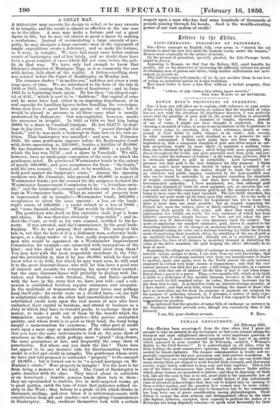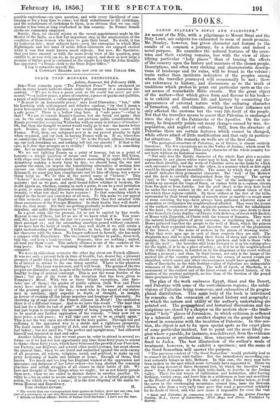FEMALE EMPLOYMENT.
5th _February 1856. Sin—Having been accustomed, from the time when first I grew old enough to take an interest in any newspaper, to find your journal among the foremost and most enlightened advocates of every important question of social progress, I must confess myself surprised by the tone of an article which appeared in your number for 2d February, entitled, " Woman's Rights in the Civil Service." It is acknowledged on all sides, even by those holding the most conservative opinions, that additional channels are needed for female industry. The deepest commiseration is loudly and re- peatedly expressed for the poor governess and half-starved seamstress. It is said that they are overworked and underpaid ; and no one can doubt that many among them are obliged to work beyond their strength, and that many receive_ wages barely sufficient to keep soul and body together. This is but one of the bitter consequences that result from the narrow limits within which alone women are permitted to labour; and they in disposing of their toil, like all who seek to buy or to sell, must yield to the immutable law of demand and supply. The sincere and candid friend of this unfortunate class of labourers acknowledges that they can be helped only by opening to them a wider market, and the question how women may be more exten- sively employed with benefit not only to themselves but to the community has long been one of grave consideration among philanthropists. Their fitness to occupy the most arduous and distinguished offices in the state (the highest, however, excepted, their capacity to perform the duties of a Sovereign not being disputed) remains—to speak most favourably for their
possible aspirations—an open question, and with every likelihood of con- tinuing so for a long time to come; but their suitableness to fill clerkshipe, and the suitableness of clerkships to them, is so obvious that we can only wonder it has been so long overlooked in this country. In France female clerks are commonly employed.
Surely, then, we should rejoice at the recent appointment made by the Master of the Rolls, as a first but important step in the amelioration of the condition of those women who have to gain their bread. No doubt, it has its ludicrous side ; most subjects have—even the enterprise in which Miss Nightingale and her band of noble fellow-labourers are engaged excited when it was first made known much ridicule. But now,. Mr. Spectator, that you have amused us with the more lively view of the question, pray exhibit it, as you well can do, in its graver aspect, and show us how large a promise of future good is contained in the simple fact that Sir John Ronully has appointed "a female clerk to the State Paper Office." I beg to subscribe m.yself, Sir,
A. CONSTANT READER AND NOT ONE OF THE UNFAIR SHE.



























 Previous page
Previous page